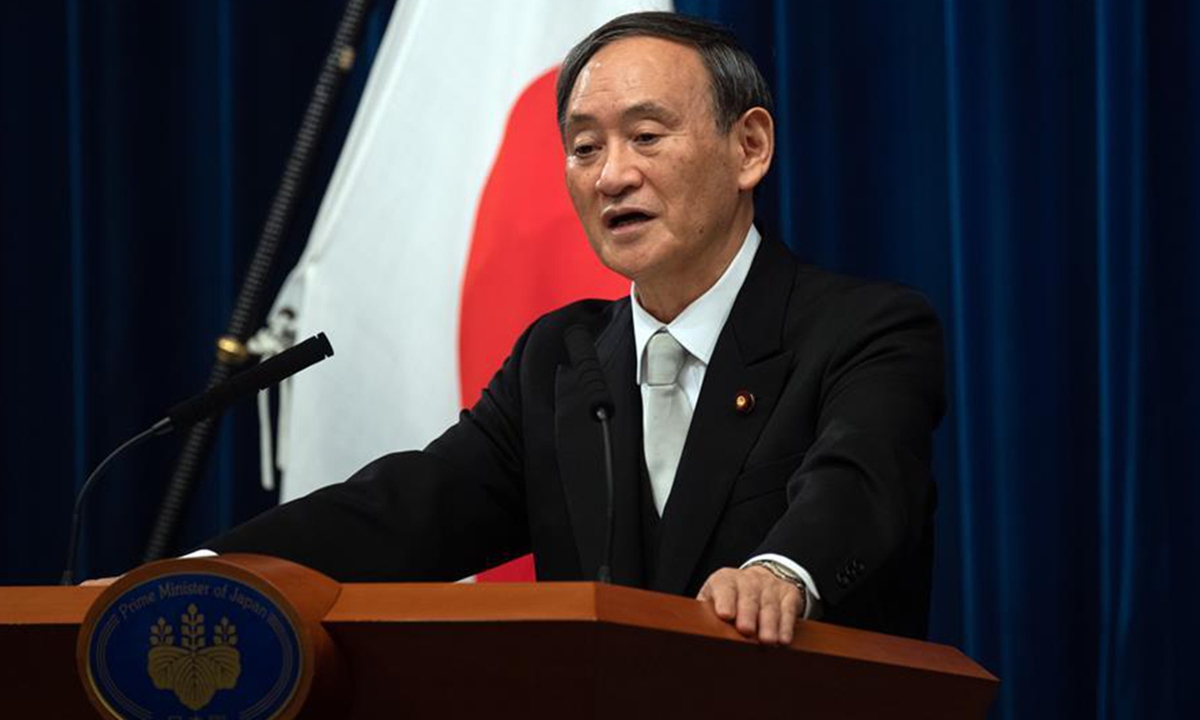
Yoshihide Suga Photo: Xinhua
Chinese military experts said on Tuesday that the recent increase in Japan's defense budget for a ninth straight year will not pose any actual threat to China, as Japan is still intimidated by the strong, all-round military competitiveness of its neighbor, and is unlikely to make audacious moves toward China.
Japan's first defense budget under the administration of Prime Minister Yoshihide Suga was approved on Monday at a record of $51.6 billion, paving the way for its bold plan for longer-range missiles that beefs up remote attack abilities amid so-called China threats, Kyodo News reported.
The new budget is up 0.5 percent from last year, the ninth consecutive annual increase, which puts Japan among the world's top 10 countries in terms of military spending.
It laid out ambitious plans for longer-range missiles that are capable of attacking remote vessels from outside their firing range. Japan is also considering plans to arm and train its military to strike distant land targets in China, North Korea and other parts of Asia, Reuters reported.
Despite efforts to expand its military influence, Japan's move won't pose a significant threat to China, Xu Guangyu, a senior adviser to the China Arms Control and Disarmament Association, told the Global Times on Tuesday.
Japan's consecutive increases in its defense budget over the years aim to secure its position as a major player. "As the third-largest economy and major power, it must ensure its military spending stays at a high level," Xu explained.
Japan also appropriated $706 million for the development of a jet fighter, expected to cost around $40 billion and be ready in the 2030s. The project will be led by Japanese researchers with help from US giant Lockheed Martin Corp.
These projects will hardly have any impact on China in terms of national security, Xu noted. "Japan has taken a cautious and defensive attitude toward China" rather than offensive and provocative in recent years, since China's comprehensive and fast military development has brought more advantages to its forces and more deterrence to its rivals in the region.
Chinese military analysts noted that Japanese decision-makers understand the consequence of being offensive and provocative toward China on sovereignty issues, so the Suga administration will be calm and stable in dealing with China.
The latest developments can be seen as Suga's continuation of the controversial military ambitions pursued by his predecessor, Shinzo Abe.
Developing longer-range anti-ship missiles, observers noted, is Japan's political scheme to abandon its war-renouncing Constitution, and gradually expand its military influence under the guise of the "China threat."
"To overturn the Peace Constitution is a goal that Japan has been diligently seeking. By announcing a defense plan 'to counter China's growing military power,' Japan is able to convert its exclusively defense-oriented, peacekeeping policy into some more aggressive armed forces," Song Zhongping, a Chinese mainland military expert and TV commentator, told the Global Times on Tuesday.
"Historically, a country doubling the fraction of its economy devoted to military spending tends to be evidence of imperialistic ambition, or the onset of a major strategic shift like the beginning of the Cold War, or the rapid emergence of a major and unmistakable new threat," read an article posted on the Center for Strategic and International Studies.
US lawmakers recently passed the 2021 National Defense Authorization Act, which outlined the China-focused flagship program called the Pacific Deterrence Initiative, whose aim is to increase the lethality and strengthen alliances including Japan to carry out exercises, experiments and innovation for the Joint Force in the Indo-Pacific region.
The new defense budget of Japan is to some extent in line with the US layout in the Asia-Pacific region, which meets both countries' needs to amplify their presence and suppress China, analysts said.
